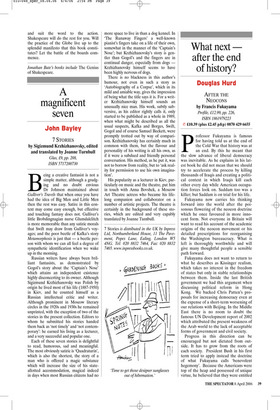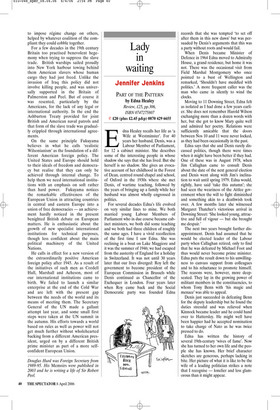What next — after the end of history?
Douglas Hurd
AFTER THE NEOCONS by Francis Fukuyama Profile, £12.99, pp. 226, ISBN 1861979223 ✆ £10.39 (plus £2.45 p&p) 0870 429 6655 Professor Fukuyama is famous for having told us at the end of the Cold War that history was at an end. By this he meant that the slow advance of liberal democracy was inevitable. As he explains in his latest book he did not mean that we should try to accelerate the process by killing thousands of Iraqis and creating a political context in which Iraqis kill each other every day while American occupation forces look on. Saddam too was a killer; but Saddam is on trial for his life.
Fukuyama now carries his thinking forward into the world after the poisonous flowering of the neocon doctrine which he once favoured in more innocent form. Not everyone in Britain will want to read his account of the academic origins of the neocon movement or his detailed prescriptions for reorganising the Washington bureaucracy. What is left is thoroughly worthwhile and will give many thoughtful people a sensible path forward.
Fukuyama does not want to return to what he describes as Kissinger realism, which takes no interest in the freedom of states but only in stable relationships between them. Inside the last British government we had this argument when discussing political reform in Hong Kong. We backed Chris Patten’s proposals for increasing democracy even at the expense of a short-term worsening of our relations with Beijing. In the Middle East there is no room to doubt the famous UN Development report of 2002 which attributed the present weakness of the Arab world to the lack of acceptable forms of government and civil society.
Progress in this direction can be encouraged but not dictated from outside. It has to grow from the roots of each society. President Bush in his first term tried to apply instead the doctrine of what Fukuyama calls ‘benevolent hegemony’. Because the Americans were top of the heap and possessed of unique virtue, he believed that they were entitled to impose régime change on others, helped by whatever coalition of the compliant they could cobble together.
For a few decades in the 19th century Britain too practised benevolent hegemony when trying to suppress the slave trade. British warships sailed proudly into New York harbour towing behind them American slavers whose human cargo they had just freed. Unlike the invasion of Iraq this policy did not involve killing people, and was universally supported in the Britain of Palmerston and Peel. But of course it was resented, particularly by the Americans, for the lack of any legal or international authority. In the end the Ashburton Treaty provided for joint British and American naval patrols and that form of the slave trade was gradually crippled through international agreements.
On the same principle Fukuyama believes in what he calls ‘realistic Wilsonianism’ as the foundation of a different American foreign policy. The United States and Europe should hold to their ideals of freedom and democracy but realise that they can only be achieved through internal change. To help them we need international institutions with an emphasis on soft rather than hard power. Fukuyama notices the remarkable effectiveness of the European Union in attracting countries in central and eastern Europe into a union of free democracies — an achievement hardly noticed in the present benighted British debate on European matters. He is enthusiastic about the growth of new specialist international institutions for technical purposes, though less confident about the main political machinery of the United Nations.
He calls in effect for a new version of the extraordinarily positive American foreign policy after 1945. As a result of the initiatives of such men as Cordell Hull, Marshall and Acheson, most of our international institutions came to birth. We failed to launch a similar enterprise at the end of the Cold War and are left with the present gap between the needs of the world and its means of meeting them. The Secretary General of the UN made a gallant attempt last year, and some small first steps were taken at the UN summit in the autumn. His efforts towards a world based on rules as well as power will not get much further without wholehearted backing from a different American president, urged on by a different British prime minister as part of a more selfconfident European Union.
Douglas Hurd was Foreign Secretary from 1989-95. His Memoirs were published in 2003 and he is writing a life of Sir Robert Peel.











































































 Previous page
Previous page